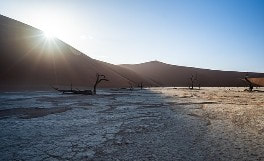 Photo by Eelco Bohtlingk on Unsplash
Photo by Eelco Bohtlingk on Unsplash The UN Commission on the Status of Women negotiated the relations between climate change and gender inequality. This was a perfect opportunity for the Parliamentarians of the 2030 Agenda and the Advisory Board on Gender and Development to organise a seminar on the impact of climate change on women and girls’ SRHR.
40 participants, including parliamentary assistants, cabinet members and experts of the Directorate General for Development (DGD) as well as civil society stakeholders and academics were provided with a window into the challenges that climate change poses for the health and rights of women and girls in low income countries (LIC).
40 participants, including parliamentary assistants, cabinet members and experts of the Directorate General for Development (DGD) as well as civil society stakeholders and academics were provided with a window into the challenges that climate change poses for the health and rights of women and girls in low income countries (LIC).
Dr. Fiona Scorgie, medical anthropologist, who is researching the influence of heat on pregnant women and their newborns in Kenya and Burkina Faso explained how heat causes great discomfort to pregnant women, such as dehydration, lack of sleep and fear, and thus directly affects women’s physical and mental health. Newborns are equally impacted by heat, with more early births and low birth weights. As health centres are badly equipped against the heat, inside temperatures easily outdo outside temperatures. This makes women less inclined to look for medical care and makes women decide to give birth at home, without trained health assistance.
Pamela Chinembiri of Plan International explained how young women in Zimbabwe and Zambia are trained and assisted in conducting their own research into the impact of climate change on their daily lives and that of their communities. The participatory research shows that periods of drought lead to water shortages at school, which makes some girls stay away during their periods as they’re unable to wash themselves. Floods also impact their lives. Girls cannot attend school when roads are impassable and the floods force some girls to stay in collective shelters for certain periods of times, where they run a higher risk of sexual transgressive behaviour.
Raffaela Dattler of IPPF put the consequences of climate change in a broader context and took the discussion back to the international negotiations in the UN Commission on the Status of Women (CSW). Negotiators should recognise the impact of climate crisis on gender equality and specifically sexual and reproductive health and rights, they should support a human rights based approach and ensure attention for the importance of sexual and reproductive health care during climate change-induced disasters, including for displaced people and refugees.
Dattler also warned for the red line in the negotiations. We should not fall into the trap of seeking to stop global warming by means of family planning. The biggest cause of climate change lies with the production and consumption patterns of high income countries such as ours, and not in the size of families in low income countries. Their ecological footprint is negligible compared to the average American or European citizen. (The carbon footprint of a Belgian household is 145 times that of a Congolese family.) While women in LIC are the least responsible for climate change, their lives and those of their families are the hardest hit.
Find out more in IPPF’s position paper (available in English, French and Spanish).
Pamela Chinembiri of Plan International explained how young women in Zimbabwe and Zambia are trained and assisted in conducting their own research into the impact of climate change on their daily lives and that of their communities. The participatory research shows that periods of drought lead to water shortages at school, which makes some girls stay away during their periods as they’re unable to wash themselves. Floods also impact their lives. Girls cannot attend school when roads are impassable and the floods force some girls to stay in collective shelters for certain periods of times, where they run a higher risk of sexual transgressive behaviour.
Raffaela Dattler of IPPF put the consequences of climate change in a broader context and took the discussion back to the international negotiations in the UN Commission on the Status of Women (CSW). Negotiators should recognise the impact of climate crisis on gender equality and specifically sexual and reproductive health and rights, they should support a human rights based approach and ensure attention for the importance of sexual and reproductive health care during climate change-induced disasters, including for displaced people and refugees.
Dattler also warned for the red line in the negotiations. We should not fall into the trap of seeking to stop global warming by means of family planning. The biggest cause of climate change lies with the production and consumption patterns of high income countries such as ours, and not in the size of families in low income countries. Their ecological footprint is negligible compared to the average American or European citizen. (The carbon footprint of a Belgian household is 145 times that of a Congolese family.) While women in LIC are the least responsible for climate change, their lives and those of their families are the hardest hit.
Find out more in IPPF’s position paper (available in English, French and Spanish).

 RSS Feed
RSS Feed